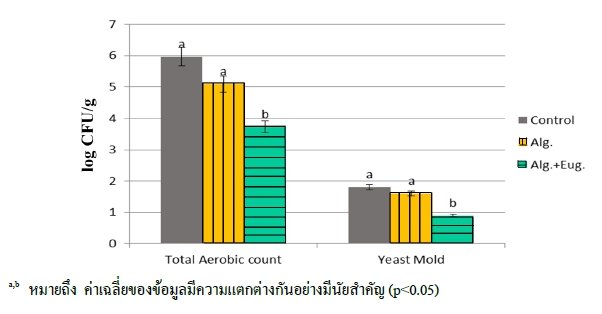Effect of edible coating formulations and storage time on physical, sensory and microbiology properties of fresh-cut papaya
Keywords:
papaya, sodium alginate, eugenol oil, edible filmAbstract
The objectives of this research were to study the formulas of edible coatings (not coated, coated with sodium alginate, and coated with sodium alginate containing eugenol oil extract) and the effect of storage time at 4 °C on the physical, sensory, and microbiological properties of cut fresh papaya by cutting ripe papaya into cubes with 2 cm in length and dipping in coating solutions consisting of sodium alginate, glycerol, and sunflower oil at the concentration of 2.00, 1.50, and 0.025 %w/v, respectively. For formula containing sodium alginate and eugenol oil extract: adding eugenol oil extract at 0.10 %w/v concentration, it was found that coating of cut fresh papaya with sodium alginate and sodium alginate with eugenol oil extract helped to reduce weight loss and maintain the firmness better than uncoated samples. Consumers’ rating on the liking for the smell and taste of the samples for all treatments was not statistically significantly different. The samples coated with sodium alginate and sodium alginate with eugenol oil extract did not significantly have different liking scores for appearance, color, and firmness as well as the overall liking, and the liking scores were significantly higher than uncoated samples. Samples coated with sodium alginate and sodium alginate with eugenol oil extract had the overall liking scores between 6 and 7, indicating slight to moderate liking of consumers. Compared to other treatments, samples coated with sodium alginate containing eugenol oil extract could better inhibit aerobic bacteria and yeast during storage at 4 °C.


